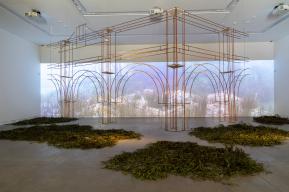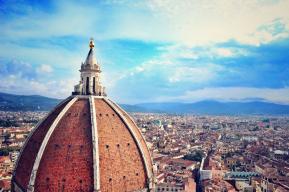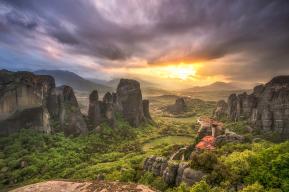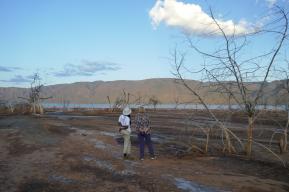Article
Celebrating its 50th anniversary, the International Geoscience Programme has now 60 projects underway
Gathered between 14th and 16th of March 2022, the IGCP Council, with the support of the IGCP Scientific Board and UNESCO Secretariat, assessed the progress of the programme during the previous year and the research results of the 57 active projects. The council also evaluated 27 new project proposals submitted as of 15th September 2021.
The Council decided to continue supporting 55 ongoing projects and approved five new entries, reaching a record number of 60 active IGCP projects in 2022. These projects will receive more than $280.000 in financial support from UNESCO with the contribution of the International Union of Geological Sciences, Jeju Province Development Corporation and UNESCO Chinese National Commission.
Since 1972, IGCP has harnessed the intellectual capacity of a worldwide network of geoscientists. The programme is the oldest and most successful example of a scientific partnership between a non-governmental organization (the International Union of Geological Sciences; IUGS) and an intergovernmental organization (UNESCO).
Project leaders
Thanks to the UNESCO IGCP Secretariat’s extensive outreach and communication campaigns, the number of new project proposal submissions and project leaders increased considerably since 2016 reaching more than 325 projects leaders from more than 90 countries collaborating under the umbrella of UNESCO.
Female project leaders and participating researchers
The IGCP is a unique project in regards to gender with nearly 40% of researchers being females and with 40% of female project leaders.
IGCP's Vision
For 50 years, IGCP adapted its global requirements and recently focused on responsible and environmental resource extraction, natural hazard resilience, preparedness and adaptability in an era of changing climate. Collaborative projects with a special emphasis on the benefit to society, capacity-building and the advancement and sharing of knowledge between earth scientists are being prioritized by the Council.
In addition to the five main themes (Earth Resources, Global Change, Geohazards, Hydrogeology and Geodynamic), IGCP launched especial calls in 2020 for proposals related to Geoheritage for Sustainable development; Geoparks; Geodiversity; Anthropocene; Artificial Intelligence (AI), Big Data and Cloud Computing Methodologies applications in Geosciences as well as Enhancing Societal Acceptance of the Sustainable Development of Earth’s Geological Resources, theme which was approved by the Council in 2021.
New 2022 Projects
Project 741- Sustainable Mineral Resource Development in Tethys Metallogenic Domain
Leader: Mr Wen-Chang Li (China) with participating researchers from Pakistan, Morocco, Turkey and Indonesia.
Mineral resources are the foundation of global economy and social development being critical to the welfare of people in developing countries. The Tethys (a region which corresponds to the location of an ancient ocean called Tethys located between the Gondwana and Laurasia continents, before the opening of the Indian and Atlantic oceans during the Cretaceous Period) is one of the world’s three most important mineral domains and represents an ideal region for studying the origin of ore deposits (metallogeny) and sustainable mineral resource development.
During the project, and by better understanding the region, researchers aim to improve the utilization rates of mineral resources and to help the developing countries in the region to update national mineral policy to meet the requirements of sustainable development and globalized markets while enhancing the societal acceptance of mineral development.

Project 724 Fluid geochemistry and earthquake forecasting
Leader: Ying Li (China) with participating researchers from, Iran, Italy, Turkey and Greece
Fluid geochemistry anomalies can be an effective earthquake precursor. In this project, researchers plan to conduct comparative studies on the fluid geochemistry anomalies in high seismicity areas characterized by recent destructive earthquakes and challenge the use of the geochemistry of fluids in the earthquake forecasting.

Project 746- RESOURCES4ALL
Leader: Dolores Pereira (Spain) with participating researchers from Mozambique, Angola, Italy, Portugal, Spain, South Africa, Angola, Cabo Verde
Raw materials are essential for the evolution of our society. However, there is a huge gap between economic interests of the extraction of commodities and the perception that society has of the whole process. Traditionally, mining has being linked to disastrous environmental consequences, with disappearance of landscapes and contamination of soils and waters.
Resources4All will start conversations in the frame of UNESCO-IGCP to explain the value of the raw materials, their application with focus on good mining practices, taking place in seminars, workshops and a permanent platform feed with the participants help and future initiatives related to this issue.

Project 751- 4GEON: Geoparks’ People of Four Continents Connected through Playful Earth Heritage Education
Leader: Martina Pásková (Czechia) and participating researchers from Tanzania, Nicaragua, Peru and the Philippines
The local and indigenous communities of Geoparks participating in this project, which are facing growing pressure related to the exploitation of their land - including local geoheritage - are gradually implementing and evaluating novel concepts of playful geoeducation. The general public is being involved through a user-friendly geoportal which explains how geology relates to the life of local people. During the project, geoambassadors will be selected each year who will, together with geopark experts and representatives, convene at a global geo-get-together. There they will discuss their findings, views, and plans with fellows from around the world.

Project 765-Capacity building networks and improved methodologies for increased interoperability mapping and monitoring carbon stocks
Leader: Mario Guevara (Mexico) and participating researchers from Chile, Congo
There is a pressing need to support sustainable soil management initiatives to mitigate and adapt to climate change. Large discrepancies and unknowns exist around soil organic carbon (SOC) sequestration trends affecting climate change. A large challenge is to identify areas with the potential for SOC sequestration. This project aims to harmonize and standardize available methodologies for quantifying SOC sequestration and to reduce uncertainties around SOC sequestration estimates from the country to the global scale.











